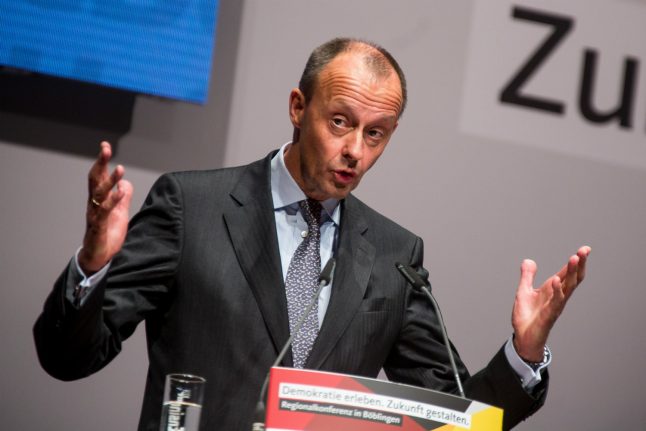At the regional conference in Böblingen, Baden-Württemberg, on Tuesday evening the candidates for the Christian Democratic (CDU) leadership were on good form as they took turns to get their points across.
They've been on a gruelling tour of the country, reaching out to CDU members ahead of the vote that will take place at the party conference on December 7th in Hamburg.
But with only three regional events left, the race is on to see who has made the best impression.
'Anti-Merkel confident'
Friedrich Merz, who has been dubbed by commentators as the 'anti-Merkel' because he has a completely different political style and attitude to Angela Merkel, is optimistic about his chances of taking over the chancellor's reigns.
In interviews with Funke Media Group newspapers, he said he was convinced he would win the race for party leadership.
“I have not only the intention, but also the firm conviction that I will be elected CDU chairman,” the 63-year-old said.
After his election, the first thing he would do would be “to have a detailed and confidential conversation with Angela Merkel”. And he will write to all those who have left the CDU in recent years – “and ask them to rejoin”.
Merz also reiterated his demand for the tax system to be simplified. He had previously said that people should technically be able to do their tax declaration on a beer mat.
“Clearly, the new beer mat is a tax app for the smartphone,” he said.
Having been sidelined by Merkel in 2009 and moving away from politics, Merz has amassed a fortune in the private sector and owns two private jets. He recently disclosed that his annual earnings amount to around €1million.
It's a far cry from Merkel's image as a cautious spender and it remains to be seen how his wealth will impact on his campaign to be leader.
SEE ALSO: Who are Merkel's possible successors as CDU party chief?
Merz also fuelled controversy at the CDU regional meeting a week ago in Thuringia when he questioned whether Germany should continue to have asylum written as a basic right in its constitution.
It's a difficult topic in Germany because the asylum right was included in the constitution as a reaction to the Nazi dictatorship and the Holocaust.
Party 'failure'
Meanwhile, a poll last week placed Annegret Kramp-Karrenbauer, 56, as the top choice to replace Merkel. Kramp-Karrenbauer, also known as AKK, is considered to be a Merkel loyalist.
But at Böblingen, Kramp-Karrenbauer didn't hold back on her words as she spoke of a “failure” of her party in view of the Union's loss of votes and the strengthening of the Alternative for Germany (AfD) party.
 Candidates Friedrich Merz, Jens Spahn, the moderator and Annegret Kramp-Karrenbauer draw lots to decide the order in which they'll speak on Tuesday. Photo: DPA
Candidates Friedrich Merz, Jens Spahn, the moderator and Annegret Kramp-Karrenbauer draw lots to decide the order in which they'll speak on Tuesday. Photo: DPA
AKK said ordinary citizens and party members had the feeling that the CDU/CSU had not taken enough notice of concerns and the “justified fears” of people.
“Then we should not be surprised if these exact people are looking for parties that at least give them the impression that they care about them,” Kramp-Karrenbauer said.
Spahn, who at 38 is the youngest of the frontrunner candidates, said that the CDU had lost a lot of confidence. It must again conduct broader and more controversial debates, he said.
The Health Minister said in an interview with the Rheinische Post newspaper that he would opt for special party conferences on the environment and Europe in the event of his election as CDU leader. He said “the CDU must discuss future issues more thoroughly”.
Spahn has previously ruffled feathers with his negative comments about the UN migration pact, as well as on tax issues.
Similar to his competitors, Merz, warned against the Union's social democratization: “We don't have to adopt all the positions the Social Democrats think are right,” he said.
SEE ALSO: Should people without children be forced to pay more tax in Germany?
Positive competition
The three candidates were presenting themselves in Böblingen at the fifth of a total of eight regional events.
On Wednesday they will travel to Düsseldorf – to the CDU state association of North Rhine-Westphalia with the largest number of members, and from which both Merz and Spahn come from.
This will be followed by two more conferences: Bremen on Thursday and Berlin on Friday.
SEE ALSO: How the race to replace Merkel is breathing life into the CDU
A day after her party suffered severe losses in the Hesse state elections on October 28th, Merkel announced she would no longer run for re-election as party leader – nor as chancellor when her term comes to an end in 2021.
But her decision seems to have given the party a new lease of life.
Kramp-Karrenbauer described the competition between the candidates as “absolutely positive” and “stimulating for the party”.
“So far the competition is a fair one, even if there are points, which are addressed critically,” she told the Passauer Neue Presse. “It is clear that the party should continue after the conference as strengthened and united.”




 Please whitelist us to continue reading.
Please whitelist us to continue reading.
Member comments